Below you will find books I have identified as being particularly insightful and which have been formative in my orientation.
Authors influential in my development as a therapist have included those which have discussed the relationship between our development of self and the messages we received in our family of origin experiences. I have found myself particularly fascinated with the unconscious patterns that result from these messages and which go on to govern our life choices when not identified and reconciled from a conscious place.
Though these patterns are pervasive in our overall behavior, fascinating most of all has been recognizing how these dynamics play out in our selection of, and relationship to romantic partners. Harville Hendrix, Ph.D, leading author and pioneer on this topic, discusses this phenomenon, both in regards to romantic relationships as well as opportunities to heal through new healthy relationships and parenting. 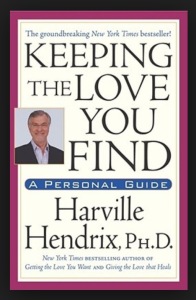
Hendrix’s ‘Keeping the Love You Find’ is particularly enlightening as, in his distinction of two primary personality types, he guides readers in identifying common behaviors patterns in themselves, per each developmental stage, and consequently, and in what life stage wounding likely occurred. With this knowledge is the opportunity to identify and heal original wounds. His discussion further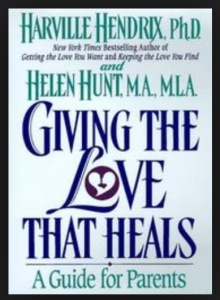 empowers readers to recognize patterns evolving in their own partner selection, affording them the opportunity to do differently.
empowers readers to recognize patterns evolving in their own partner selection, affording them the opportunity to do differently.
I consider Hendrix’s other book listed, ‘Giving the Love that Heals’ to be equally impactful; his discussion still guiding readers in identifying dysfunctional behavior patterns, but also offering corrective action through alterations in the relationship one has with their child or significant other. In this, he provides strategies to healing these original wounds.
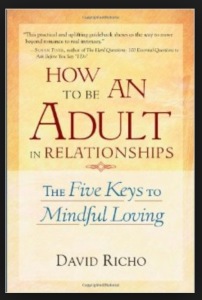 Another favorite author I have identified is David Richo. He has written several books I see as relevant to happy living, and certainly which mirror my philosophy in practice. Along the lines of relationship dynamics, he is author to ‘How to Be an Adult in Relationships’; a powerful journey through attraction, relationship maintenance, and the experience of loss when relationships come to an end. Through the same orientation as discussed by Hendrix, he explores these ideas with an understanding of how our upbringing impacts this profoundly powerful and sensitive area of human life.
Another favorite author I have identified is David Richo. He has written several books I see as relevant to happy living, and certainly which mirror my philosophy in practice. Along the lines of relationship dynamics, he is author to ‘How to Be an Adult in Relationships’; a powerful journey through attraction, relationship maintenance, and the experience of loss when relationships come to an end. Through the same orientation as discussed by Hendrix, he explores these ideas with an understanding of how our upbringing impacts this profoundly powerful and sensitive area of human life. 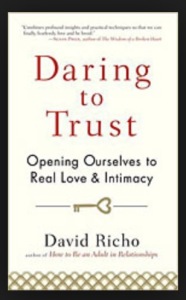
In relation to relationships, Richo discusses the tenants of trust: where it originates, what it consists of, how it builds, how it breaks, and how we can go about repairing it when it has broken. A person’s ability to trust, so profoundly connected to their experience during attachment, and this, such a expansive issue in our society (which does anything but foster opportunities where attachment can be satiated as completely as it is demanded,) Richo’s book ‘Daring to Trust‘ addresses what I believe to be a profound issue for us all.
In his book,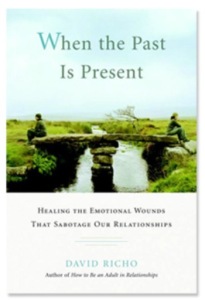 ‘When the Past is Present‘ Richo also addresses how early life wounding impacts our perceptions in everyday life and how relevant this is to become aware of.
‘When the Past is Present‘ Richo also addresses how early life wounding impacts our perceptions in everyday life and how relevant this is to become aware of.
And lastly, Richo’s book, The Five Things We Cannot Change and the Happiness We Find by Embracing them‘, offers a profound outline of what is reason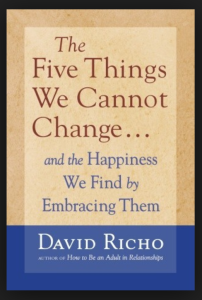 able to expect from the human experience and how we inhibit our chances at happiness when we hold out for, or punish when our experiences fall short. With his guidelines as an outline, a new paradigm of understanding can be created, enabling a new understanding of life and with that, a new appreciation for.
able to expect from the human experience and how we inhibit our chances at happiness when we hold out for, or punish when our experiences fall short. With his guidelines as an outline, a new paradigm of understanding can be created, enabling a new understanding of life and with that, a new appreciation for.
David Schnarch, Ph.D, another favorite author, offers what has become an increasingly timeless account of the fundamental relationship dynamics at play when two people engage in intimacy. In his book, ‘Passionate Marriage,‘ Schnarch bravely tells the honest truth about what really transpires in marria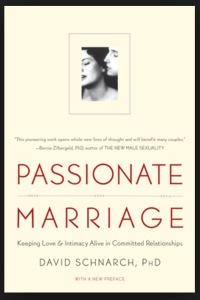 ge and how marital discord is in fact an invitation to differentiate. He disassembles any notions held about healthy relationships requiring the same vantage point as to be successful, instead arguing that it is our differences, and our developed ability to stand solidly in our differences–in relation to our partner–that strengthens a relationship. He argues that it is this ‘differentiation’ that makes way for true interpersonal intimacy. He explores these ideas from the same orientation as Hendrix and Richo, challenging readers to assess and take ownership for how their respective upbringings impact their belief systems and needs and how this can be managed in relation to a partner who is being governed by the same. While written in relation to romantic relationships with an aim to achieving greater intimacy (sexual and otherwise), principles broached relate just as soundly to the work each of us must do to be securely whole in and of ourselves.
ge and how marital discord is in fact an invitation to differentiate. He disassembles any notions held about healthy relationships requiring the same vantage point as to be successful, instead arguing that it is our differences, and our developed ability to stand solidly in our differences–in relation to our partner–that strengthens a relationship. He argues that it is this ‘differentiation’ that makes way for true interpersonal intimacy. He explores these ideas from the same orientation as Hendrix and Richo, challenging readers to assess and take ownership for how their respective upbringings impact their belief systems and needs and how this can be managed in relation to a partner who is being governed by the same. While written in relation to romantic relationships with an aim to achieving greater intimacy (sexual and otherwise), principles broached relate just as soundly to the work each of us must do to be securely whole in and of ourselves.
Just as Schnarch’s discussion of differentiation coincides with this notion of codependency, it seems that codependency, itself, has been dangerously limited to persons connected with drug and alcohol addiction. This, excusing so many others–who may not have affiliation with that particular issue–from looking at how it 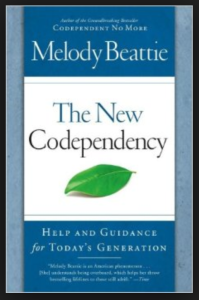 may live in them also. Truth be told, our society is unbelievably codependent, and this codependency holds us tightly in toxic dynamics with others; limiting our sense of empowerment and inhibiting the development of any real self-esteem. Even more disabling is the limited definition so commonly assigned to it; persons discounting its presence by not realizing the breadth of what all it includes.
may live in them also. Truth be told, our society is unbelievably codependent, and this codependency holds us tightly in toxic dynamics with others; limiting our sense of empowerment and inhibiting the development of any real self-esteem. Even more disabling is the limited definition so commonly assigned to it; persons discounting its presence by not realizing the breadth of what all it includes.
Melody Beattie, leading author on the topic, spells out in no uncertain terms, a more thorough definition; one which examines healthy boundaries and challenges types of care-taking that are counterproductive to healthy living. It is my belief that addressing the codependency that lives in all of us (through becoming aware of how and where it manifests in our lives and behavior) is integral to healthy living and feeling empowered.
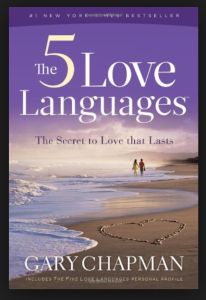 As we navigate interpersonal relationships, how are our pasts impact our perspectives, and how relationships might be maintained through unspoken dynamics such as those sustained with codependency, we are also invited to discover how our innate nature further contributes to our experiences with others. ‘The Five Love Languages‘ by Gary Chapman raises another important consideration; How do we give and receive love? And how does having an understanding of this impact the health and well-being of relationships? Chapman poses the idea that there are five common styles of interacting (and in particular, styles of showing love) and that each individual has a natural predisposition towards one of them. In his book, Chapman makes the argument that if we are giving and receiving love in ways not felt or understood by our partner, that relationships can often fail that might otherwise flourish when these things are considered. It is my belief that as we move forward in a process of self-discovery
As we navigate interpersonal relationships, how are our pasts impact our perspectives, and how relationships might be maintained through unspoken dynamics such as those sustained with codependency, we are also invited to discover how our innate nature further contributes to our experiences with others. ‘The Five Love Languages‘ by Gary Chapman raises another important consideration; How do we give and receive love? And how does having an understanding of this impact the health and well-being of relationships? Chapman poses the idea that there are five common styles of interacting (and in particular, styles of showing love) and that each individual has a natural predisposition towards one of them. In his book, Chapman makes the argument that if we are giving and receiving love in ways not felt or understood by our partner, that relationships can often fail that might otherwise flourish when these things are considered. It is my belief that as we move forward in a process of self-discovery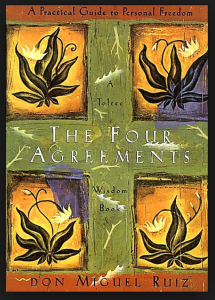 , that this awareness is also significant in maintaining healthy relationships.
, that this awareness is also significant in maintaining healthy relationships.
As a final note on healthy living, I want to leave you with this final recommendation; ‘The Four Agreements‘ by Don Miguel Ruiz. Just as the title would suggest, this book further explains what Ruiz refers to as the four agreements each person should make to themselves and their life. The four agreements, as he describes them are as follows: Be impeccable with your word, Don’t take anything personally, Don’t make assumptions, and Always Do your Best. Without going into further detail as Ruiz does in his text, this orientation is to suggest that a life lived with integrity, which considers the ebb and flow of life and how a person’s ‘best’ fluctuates at any given moment, that people deserve to be taken at their word and given the opportunity to say what is without assumption, and that projections are always at play, thus things said are never to be taken personally, is one lived happily. While there are many laws to live by, these underpin my orientation towards a life therapy might hope to achieve.